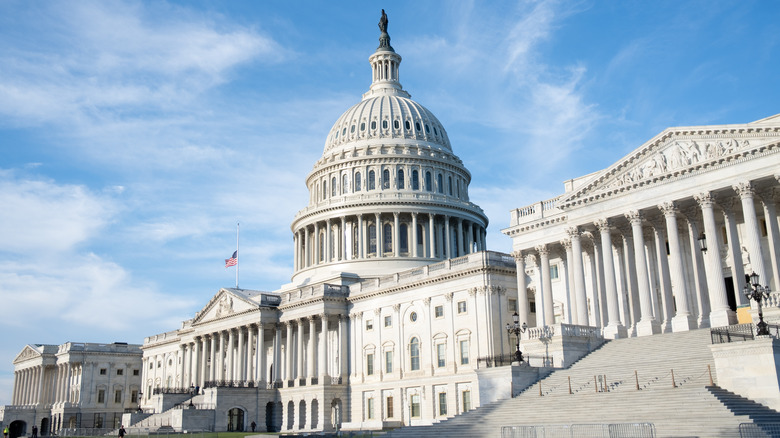The Real Reason 22 US States Are Suing The USDA
On July 26, attorneys general from 22 U.S. states filed a lawsuit against the Biden Administration and the USDA, challenging the guidelines and related policy update issued by the USDA's Food and Nutrition Service, per The Hill. These guidelines, in effect, require schools with federally subsidized meal programs to take certain actions toward enforcing Title IX of the Civil Rights Act. If they don't comply, they run the risk of losing their funding for said programs, per Eater.
Title IX prohibits discrimination "based on sex, including sexual orientation and gender identity" in schools that receive federal funding from the U.S. Department of Education (about 95% of all public schools in the U.S., per Eater). The stakes are high because a school's failure to comply with Title IX could lead to the abolishment of its federally subsidized meal program, per the Duffy Law firm. And that could be devastating to children facing food scarcity and insecurity.
The actions required of schools under the new FNS guidelines include: affirmatively prohibiting discrimination on the basis of sex (including gender identity and sexual orientation), displaying signage censuring such discrimination, and investigating all related claims of discrimination. Based on the wording of the guidelines and related policy update, it would appear their purpose is to provide a framework by which schools may help ensure their own compliance with Title IX. Of course, Title IX has been prohibiting sex-based discrimination for decades. So, what exactly is the beef the plaintiff AGs have with the new guidelines?
Here's the beef
What all 22 states suing the USDA have in common, according to The Hill, is a Republican attorney general who subscribes to the notion that the guidelines and policy update issued by the USDA, via the Food and Nutrition Service, are unlawful because they are an attempt by a federal agency to enact legislation. This would run counter to the Constitution, which vests lawmaking solely in the hands of elected legislators (per The White House). Moreover, the AG plaintiffs allege that such lawmaking is based "on a misapplication of U.S. Supreme Court precedents" (via The Hill).
The precedent that the plaintiff AGs allege is being misapplied is the 2020 US Supreme Court decision in Bostock v. Clayton County (via the guidelines and policy update). Prior to Bostock, states had free reign to enact laws that permitted employers to discriminate on the basis of sex, including gender identity and sexual orientation, explains the ACLU. Post-Bostock, such laws are prohibited under Title VII of the Civil Rights Act and will not be enforced by the judicial branch, if it ever comes to that.
Under the Constitution, the judicial branch has the power to take such a position without exceeding its sphere of power (via The White House). What the plaintiff AGs seem to take issue with is a federal agency — namely, the USDA — taking the initiative to extend Bostock's holding, which applies to employers under Title VII, to schools under Title IX.
Why the 22 plaintiff states stand a chance of winning
Both Title VII and Title IX prohibit sex-based discrimination (via the EEOC and DOE). But whereas Title VII concerns discrimination in the context of employment, Title IX concerns discrimination in the education context, per Eater. Although both are part of the Civil Rights Act, and while their respective reaches overlap to the extent that schools have employees, the fact is that these two statutes are distinct — and, arguably, too distinct to legally justify applying the applicable rule of law in a case decided under Title VII to facts involving Title IX (per North Greenville University).
Moreover, that isn't even how judicial precedent works, explains the Cornell Law School. Judicial precedent applies solely to judicial cases. What that means is that decisions by the highest court in the land (i.e., the U.S. Supreme Court), do not, themselves, have the effect of rewriting law. Nor do they give anyone except elected legislators the right to rewrite law. Rather, judicial precedent provides a framework for elected legislators to draft legally enforceable laws in their own time and in their own manner.
Ultimately, the plaintiff AGs who are suing the Biden Administration in connection with the newly issued Title IX guidelines, appear to take the position that if even if Bostock were to apply to a Title IX case, that still wouldn't justify the USDA's taking it upon itself to enact guidelines that are, essentially, legislation (per The Hill).
It may come down to a Hobson's choice
A Hobson's choice is one in which all alternatives are unpalatable, per VOA News. In this case, the USDA has taken the arguably commendable initiative to draft guidelines that are intended to "combat discrimination against LGBTQ students" in schools, according to The Hill. On the other hand, if the USDA is permitted to enforce its guidelines, then schools that fail to comply stand to lose their federally subsidized meal programs, per Eater.
That, of course, stands to harm the many students who rely on free school meals for sustenance. According to Indiana Attorney General Todd Rokita, one of the lead plaintiffs in this new lawsuit against the USDA, this is tantamount to the Biden Administration holding school lunch hostage in return for across-the-board acquiescence to a "left-wing agenda" (via The Hill).
Conversely, the lawsuit challenging the USDA's new guidelines could just as easily be seen as a standing in the way of LGBTQ rights, and that stands to hurt all school children, according to Eater. In any case, it will now be up to a court to decide whether the USDA has the power to enact its guidelines, or whether LGBTQ students will have to wait for Congress to get around to legislating on their behalf.



